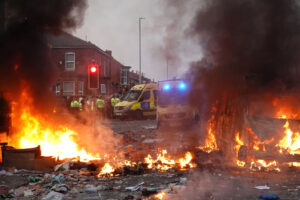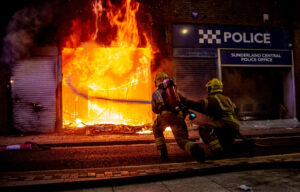We are witnessing a breakdown of order with few obvious parallels in recent British history. There have been moments of resemblance, of course: the London riots of 2011 or the “skinhead terror” of the early Seventies. The clashes between Oswald Mosley’s blackshirts and the coalitions of anti-fascists in the Thirties. Yet none of these comparisons feels quite right. What we are seeing here is something more modern and frightening.
A more apposite comparison, I think, is the period of state failure that marked the tumultuous period in British life between the imposition of direct rule in Northern Ireland in 1972 and the miners’ strike of 1984. This was a time when the state appeared to lose its authority to govern, and its willingness to do so, as war in the Middle East led to recession, political strife, international retreat and finally industrial confrontation. The trade unions entered into a war to the death first with James Callaghan and then Margaret Thatcher.
Too often Thatcher’s premiership is understood as a battle to curtail the state, rather than what it really was: the battle to reassert the state’s supremacy. In the years before her victory in 1979, the British state had repeatedly failed to impose its will, from the strikes which brought down Ted Heath in 1973-74 to the IMF bailout in 1976 and the Winter of Discontent in 1978-79. For all the u-turns and incoherence of Thatcher’s actual record as prime minister, the source of her political success was that she was willing to pay a higher price than anyone previously thought possible to reimpose the authority of the British state at home and abroad.
This is the political reality Starmer now faces. In such moments, the job of the prime minister is to play leviathan; to impose order so that civility can return. The state must reassert its authority and, crucially, its primacy. Little platoons are all well and good, but not when they have tooled up.
During the recession of the early Eighties, Thatcher doubled down on her programme of austerity, even as it drove unemployment to levels previously seen as morally unacceptable. In 1982, she went to war for a set of “small islands inhabited by three sheep”, as François Mitterand described the Falklands, not because they offered any real advantage to Britain but because of the principle that they were British. And then, in 1984, she used every means at her disposal — formal and otherwise — to break the miners’ power and take the war to the IRA after they tried to assassinate her and her entire cabinet; the most serious attack on the British state since 1945.
As David Edgerton notes in his sweeping account of post-war Britain, The Rise and Fall of the British Nation, “the key difference in the politics of the Eighties from what went before was the preparedness of government to fight dissenters very hard and to exert the rights of elected authority very strongly”. What marked Thatcher out as something different, Edgerton argues, was her willingness to press on “in the face of odium” and in so doing transform the self-confidence of the British elites. “In the Seventies there emerged the idea that the United Kingdom was becoming ungovernable,” Edgerton writes. “The answer was, of course, ‘rolling back the state’, rhetorically speaking, but it also involved making the state more autonomous, more powerful.”
Today, there is a similar sense of British state failure; not quite that the United Kingdom is ungovernable but that it is slipping that way, with the state unable to impose its will or that of the people it serves. This is not just a question of this week’s explosion of racist thuggery and violent counter-rioting — important though this is — but the seeming inability to perform even the basic functions of a state: providing prison places, timely court hearings, adequate sentencing and enough police to patrol the streets. Even simply ensuring there is a functioning health service, uncorrupted police force, humane asylum regime and working borders seems out of reach today.
Too many areas of Britain today simply do not work. These mobs did not form in Tunbridge Wells and Cambridge, but the cities that have been failed for decades. Just as my colleague Aris Roussinos has argued we use euphemisms to hide the reality of what we can all see in front of our eyes, we also ignore our basic failures of government. No one can say that Birmingham, Belfast, Liverpool, Rotherham, Blackburn or Sunderland — the centres of violence in recent days — are beacons of good governance and prosperity. Few can say that of Britain more generally.
This is not a crisis that Starmer is responsible for. What we are witnessing is a breakdown of order which has exposed the anarchic ethnic strife hiding in plain sight. The past week stands as another appalling indictment of British state failure. How has it come to this? How have we allowed gangs of balaclava-clad men to form pseudo-paramilitary mobs in our cities?
One of the most worrying aspects has not just been the breakdown of order, but the fact that the breakdown is seemingly between groups, neither of whom any longer trust, respect nor fear the police nor the law it seems — a scene more reminiscent of Northern Ireland than recent history of mainland Britain. An irony of Thatcher’s premiership, in fact, is that the one place where she was never able to fully reimpose the authority of the state was in Northern Ireland, whose uneasy communal truce was only reached after her departure.
As prime minister, Margaret Thatcher championed monetarism only to quietly abandon it, decried European integration while signing the Single European Act and portrayed herself as the Iron Lady while reducing defence spending from 4% of GDP to 3%.
What she offered, though, was a display of willpower to reimpose the authority of the British state. Any prime minister who has since offered the merest hint of losing this authority has suffered. The only time during Tony Blair’s first term as prime minister when his personal poll ratings dropped into negative territory came during the fuel protests of 2000. Blair’s own authority never recovered from the anarchic disorder which resulted from the Iraq invasion in 2003. In contrast, David Cameron’s ratings soared in the wake of the riots of 2011 when — supported by Keir Starmer, then director of public prosecutions — he responded with a display of indignant strength, condemning “criminality, pure and simple”, which he said would be “confronted and defeated” with the full force of the law. “If you are old enough to commit these crimes, you are old enough to face the punishment.”
In his message to the public, Starmer offered a similar line, condemning the “far-Right thuggery” while warning anyone who had participated in the violence: “I guarantee you will regret taking part in this disorder.” Yet, it was slow to come and stilted and unconvincing when it did, read from a piece of paper rather than flowing from a place of anger. He needs to be quicker, fluent, less rehearsed, and more emotional. He must also find a way to deal with the rise of the “Muslim Defence League” and the constant baiting from Elon Musk. Both demand displays of strength, conviction and authority. People will remember how he deals with these challenges.
Too often the role of prime minister is misunderstood — even by prime ministers themselves. Theresa May, who, like Starmer, was a hard-working, serious, respectable politician, suffered as she struggled to meet the performative demands of the office. When a suicide bomber murdered 22 parents and children attending an Ariana Grande concert in Manchester in 2017, she chose to dispatch her Home Secretary to attend a commemorative service so that she could bunker down in No. 10 to manage the crisis. This decision was taken for perfectly noble reasons, but it was wrong. It was her job as leader to mourn and explain, not simply to manage. May offered herself as the embodiment of strength and stability but was unable to match the rhetoric and paid for it. In the wake of the Grenfell Tower tragedy, she became a shell barely able to function in the role.
Starmer, scarcely one-month into the role, must understand the task at hand, the connecting thread tying together each of his “missions” for government — authority. If he is to succeed with any of his pledges, the Prime Minister must use this crisis as an opportunity to define his purpose and to play the role demanded of him: from discord to harmony, as someone once said.
Disclaimer
Some of the posts we share are controversial and we do not necessarily agree with them in the whole extend. Sometimes we agree with the content or part of it but we do not agree with the narration or language. Nevertheless we find them somehow interesting, valuable and/or informative or we share them, because we strongly believe in freedom of speech, free press and journalism. We strongly encourage you to have a critical approach to all the content, do your own research and analysis to build your own opinion.
We would be glad to have your feedback.
Source: UnHerd Read the original article here: https://unherd.com/



